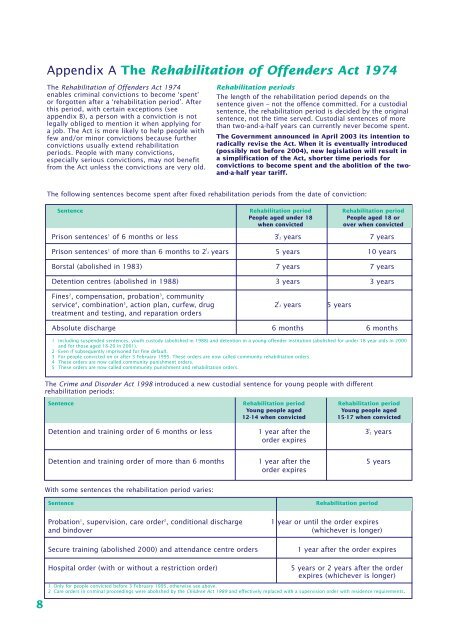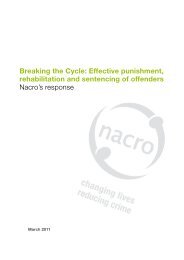Applying for work (with a criminal record): resettlement - Nacro
Applying for work (with a criminal record): resettlement - Nacro
Applying for work (with a criminal record): resettlement - Nacro
Create successful ePaper yourself
Turn your PDF publications into a flip-book with our unique Google optimized e-Paper software.
8<br />
Appendix A The Rehabilitation of Offenders Act 1974<br />
The Rehabilitation of Offenders Act 1974<br />
enables <strong>criminal</strong> convictions to become ‘spent’<br />
or <strong>for</strong>gotten after a ‘rehabilitation period’. After<br />
this period, <strong>with</strong> certain exceptions (see<br />
appendix B), a person <strong>with</strong> a conviction is not<br />
legally obliged to mention it when applying <strong>for</strong><br />
a job. The Act is more likely to help people <strong>with</strong><br />
few and/or minor convictions because further<br />
convictions usually extend rehabilitation<br />
periods. People <strong>with</strong> many convictions,<br />
especially serious convictions, may not benefit<br />
from the Act unless the convictions are very old.<br />
Rehabilitation periods<br />
The length of the rehabilitation period depends on the<br />
sentence given – not the offence committed. For a custodial<br />
sentence, the rehabilitation period is decided by the original<br />
sentence, not the time served. Custodial sentences of more<br />
than two-and-a-half years can currently never become spent.<br />
The Government announced in April 2003 its intention to<br />
radically revise the Act. When it is eventually introduced<br />
(possibly not be<strong>for</strong>e 2004), new legislation will result in<br />
a simplification of the Act, shorter time periods <strong>for</strong><br />
convictions to become spent and the abolition of the twoand-a-half<br />
year tariff.<br />
The following sentences become spent after fixed rehabilitation periods from the date of conviction:<br />
Sentence Rehabilitation period Rehabilitation period<br />
People aged under 18 People aged 18 or<br />
when convicted over when convicted<br />
Prison sentences1 1<br />
of 6 months or less 3 2 years 7 years<br />
Prison sentences1 1<br />
of more than 6 months to 2 2 years 5 years 10 years<br />
Borstal (abolished in 1983) 7 years 7 years<br />
Detention centres (abolished in 1988) 3 years 3 years<br />
Fines2 , compensation, probation3 , community<br />
service4 , combination5 , action plan, curfew, drug<br />
treatment and testing, and reparation orders<br />
1<br />
2 2 years 5 years<br />
Absolute discharge 6 months 6 months<br />
1 Including suspended sentences, youth custody (abolished in 1988) and detention in a young offender institution (abolished <strong>for</strong> under 18 year olds in 2000<br />
and <strong>for</strong> those aged 18-20 in 2001).<br />
2 Even if subsequently imprisoned <strong>for</strong> fine default.<br />
3 For people convicted on or after 3 February 1995. These orders are now called community rehabilitation orders.<br />
4 These orders are now called community punishment orders.<br />
5 These orders are now called commmunity punishment and rehabilitation orders.<br />
The Crime and Disorder Act 1998 introduced a new custodial sentence <strong>for</strong> young people <strong>with</strong> different<br />
rehabilitation periods:<br />
Sentence Rehabilitation period Rehabilitation period<br />
Young people aged Young people aged<br />
12-14 when convicted 15-17 when convicted<br />
Detention and training order of 6 months or less 1 year after the<br />
order expires<br />
1<br />
3 2 years<br />
Detention and training order of more than 6 months 1 year after the 5 years<br />
order expires<br />
With some sentences the rehabilitation period varies:<br />
Sentence Rehabilitation period<br />
Probation 1 , supervision, care order 2 , conditional discharge 1 year or until the order expires<br />
and bindover (whichever is longer)<br />
Secure training (abolished 2000) and attendance centre orders 1 year after the order expires<br />
Hospital order (<strong>with</strong> or <strong>with</strong>out a restriction order) 5 years or 2 years after the order<br />
expires (whichever is longer)<br />
1 Only <strong>for</strong> people convicted be<strong>for</strong>e 3 February 1995, otherwise see above.<br />
2 Care orders in <strong>criminal</strong> proceedings were abolished by the Children Act 1989 and effectively replaced <strong>with</strong> a supervision order <strong>with</strong> residence requirements.

















